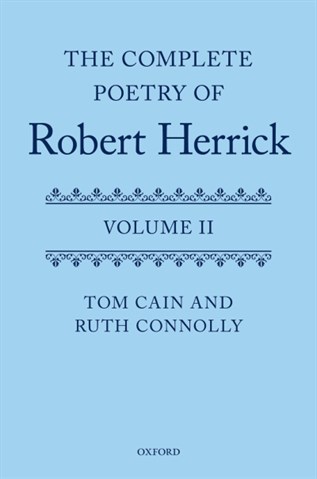Review: The Complete Poetry of Robert Herrick January 12, 2015
Author: Beach Combing | in : Modern , trackbackWhat do you want the good or the bad news? OK, let’s start with the bad. The two exquisite volumes on Beach desk today cost about 170 dollars…. each. One is entitled The Complete Poetry of Robert Herrick I and the other is entitled The Complete Poetry of Robert Herrick II, Oxford University Press, 2013. Now who in their right mind would spend 300 plus dollars on a couple of heavy books, when you could buy a crap laptop or a finger of eighteenth-century rum for the same amount? Beach looks around the room of hostile face and slowly, alone in the multitude, with red face, lifts his hand. Here’s why.
Reading Robert Herrick, one of the greatest poets to ever walk English soil, is like having a hot-cold bath with a simultaneous foot and shoulder massage. The poems range from the sensous to the obscene, from the lyrical to the bereft, from the religious to the mundane, and, then, back again. Even better most of the poems are short: Beach is one of those shallow people who just cannot be doing with anything longer than a sonnet. Then, there are so many of these poems. Herrick published all his poems in a single great volume, the Hesperides, in his late fifties: one of the great curiosities about RH is that he seemed not to have written any others once these were published and he lived for another twenty six years! There are 1130 secular poems covering every subject from the liquidity of silk on a naked body, to a baby’s grave, to bad breath, to charms for driving off elves… Only a fool would read these all at once. They are to be flicked through, borrowed, browsed, remembered, confused (many are similar), returned to, puzzled over, quoted at chance acquaintances (‘as the good vicar of Dean Prior said’), lost, found, then enjoyed again. F.R.Leavis, the celebrated English Literature Professor, who represents so much of what went wrong with the twentieth century in the western democracies, said that Herrick was ‘trivially charming’. There can be no higher recommendation…
But wait, you are saying, yes, Herrick is a great poet, but do we really have to spend 300 bucks to enjoy him? It is certainly true that there are other Herrick editions out there, though not many and none that are half as good as this one: Beach’s Herrick of choice prior to the arrival of the OUP’s set dated to the late nineteenth century. But there is also a joy in expensive books, the smell, the weight, the prestige… ‘The Herricks’ have already taken on a mythic value in the Beachcombing house. Little Miss B accidentally pushed one off the settee the other day and looked as if she had just dropped a bucket of water on mummy’s Mac: Beach didn’t shout because it was only the second volume (more of this below).
But these two tomes offer something more. First, the editors, Tom Cain and Ruth Connolly have written an outstanding biography, which beats Tom’s previous effort in the Oxford Dictionary of National Biography. Perhaps the single most important discovery (at least for Beach with his interests) is that many of the names in the poems, particularly the short epigrammatical poems are based on people from the village and environs where Herrick was vicar for many years: no wonder they remembered Herrick. For example, the rare name of a witch described in a verse was common in just that area. Historical shivers… There is a critical apparatus (with an extraordinary series of classical and other parallels) and a list of variants. There is what must be now an exhaustive list of manuscript poems, including a particularly interesting few pages on Herrick’s other fairy poems and a transmissional history and there are some musical notations that Beach didn’t really get but that look hellishly impressive.
True, the division between the volumes leaves something to be desired. The critical apparatus appears not in footnotes at the bottom of the page, in the first volume with the poems, but in the second volume, so it means that you have to keep both weighty books on your lap as you read: this can take away from the hot-cold-bath-masseuse feeling. And why didn’t they put the apparatus on the same page as the poems with notes? Publishers will tell you that footnotes cost more. But Beach wonders whether it wasn’t to encourage punters to buy the second volume… Certainly, he’d love to know the sales of volume one relative to volume two. The notes to the poems are erudite (which is right and proper), detailed exigesis on ‘prick’ as penis for example: ‘If one poore prick/ Can make thee sick’. But often the editors take too much for granted. Beach needs, sometimes, Arden-style notes spelling out some of the particulars of what Herrick is saying.
Beach is always on the look out for good books: drbeachcombing AT yahoo DOT com



